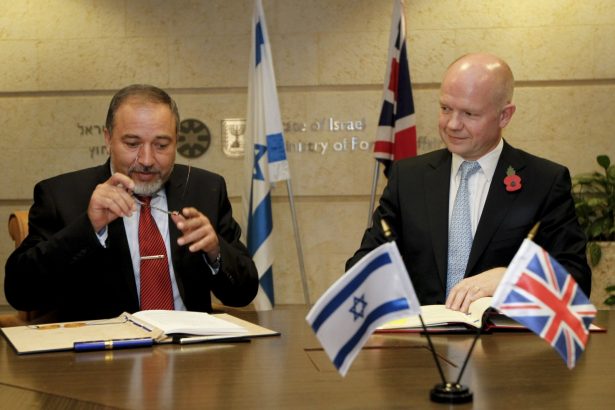The global economic crisis and the Arab Spring have impacted but not transformed the Britain-Israel relationship. Toby Greene offers a mid-term report on the Cameron-Clegg Coalition’s policy towards Israel.
A mid-term report of the UK coalition’s relations with Israel
How has Britain’s policy towards Israel shaped-up in the first two and half years of the coalition government? Has it continued in the footsteps of the Labour government or has there been anything new?
The broad shape of Britain’s relationship with Israel has not changed dramatically. The UK remains committed to a relationship of warm cooperation with Israel, including in trade and on shared strategic threats. At the same time Britain faces the perennial challenge of juggling relations with Israel with important ties to the Arab and wider Islamic world; a challenge that is heightened by inactivity in the peace process, and the right-leaning character of the current Israeli government.
However, two major global changes have impacted the coalition’s approach to Britain’s relationship with Israel. The first is the global economic crisis which has made trade a central feature of all Britain’s bilateral relationships. The second is the Arab Spring, which has transformed the political face of the region and given unprecedented significance to Arab public opinion.
UK foreign policy – an overwhelming economic imperative
Prior to the formation of the coalition you could have driven a London bus through some of the gaps between the Conservative and Liberal Democrats on foreign policy. The most significant difference was over Europe, but their attitudes to Israel were also very different. Though both parties were within the mainstream consensus in favour of a two-state solution, the Liberal Democrats and their voters were markedly more critical of Israel, whilst the Conservatives, in line with their broadly Atlanticist orientation (Beech 2011), were warmer.
However, the formation of the government saw Conservatives placed in key positions – with William Hague appointed Foreign Secretary and Alistair Burt the Middle East Minister – and foreign policy, including the Middle East, has not become a significant arena for coalition infighting. All aspects of coalition policy have been overshadowed by the imperative to use every available policy lever to strengthen Britain’s economy.
This has meant not only significant cuts in defence spending, reducing the UK’s global military reach, but a heightened emphasis on trade in Britain’s foreign policy. Hague’s first set-piece foreign policy speech, made in the grandeur of the Foreign Office’s Locarno Room on 1 July 2010, outlined a foreign policy ‘that uses diplomacy to secure our prosperity’ and that responds to shifts in global economic power to emerging economies. In short, UK PLC’s ‘bottom line’ made a major leap up the order of priorities at the FCO.
This has made relations with fast growing economies and those with money to spend particularly important. These include not only India, China, Brazil and Russia but a second tier of fast developing economies including Turkey, trumpeted by Hague in his Locarno Room speech as Europe’s biggest emerging economy. Reinvigorating ties with energy rich Gulf States, traditionally a lucrative export market, and somewhat immunised from the global economic slowdown by their oil wealth, was also an explicit priority. It was no coincidence therefore that aside from bilateral summits with France, Germany and the US, some multilateral events, and a visit to the troops in Afghanistan, Prime Minister David Cameron’s initial overseas visits were to Turkey, Abu Dhabi and India.
It was Cameron’s visit to Turkey, in the context of fraught relations between Israel and Turkey following the Mavi Marmara incident that generated the first significant banana skin for the coalition government’s relations with Israel. Cameron, clearly keen to make a good impression with his hosts, went overboard by describing Gaza as a ‘prison camp’. This upset Israel and its supporters in the UK who rejected the description and were dismayed that it came without so much as a mention of the problematic role played by Hamas.
The regional perspective – dramatic change
Another early warning sign for the Britain-Israel relationship was Hague’s emphasis in his Locarno Room speech on a link between the success of the counter-terrorism drive in Afghanistan and Pakistan and perceptions in the Islamic world of Britain and America’s role in the Middle East peace process. The implication was that Islamic public opinion would now be taken more seriously in the formation of British policy in the Israeli-Palestinian arena. Though in a subsequent speech in early 2011, David Cameron rejected the idea that Western foreign policies were responsible for radicalisation, (much as Blair had done after 7/7), he also mentioned the need to ‘resolve sources of tension – not least in Palestine.’
What no one was able to predict when the coalition came into office was the extent to which the ‘Arab Spring’ would raise the significance of Arab public opinion. The sweeping away of the old leaders of the Arab republics in 2011 created dilemmas for Britain as it did for other Western states. Britain showed initial enthusiasm for the Arab Spring, not wanting to be on the wrong side of the newly emerging political powers, and in Libya even played a direct military role. Influential parts of the Conservative party have in any case a taste for the proactive, international liberalising and democratising agenda promoted by Bush and Blair (Dodds, Elden 2008). But the tidal wave of political transformation has not sat easily with Britain’s more long-standing realist traditions of pursuing the stability of its regional allies and trading partners. In rhetorical terms, British enthusiasm for grass-roots political change has been tempered over time as Islamist parties, such as the Egyptian Muslim Brotherhood have become empowered, rather than the Facebook-savvy liberals who were the initial face of the revolutionary wave.
However, ministers and officials have been consistent in linking the Arab Spring to the Israeli-Palestinian issue. They made the case to Israelis that the peace process was now even more urgent, arguing that, ‘if the new political order settles around it at a time of minimum hope in the peace process, then it may well lead to the political leadership of those countries being maximally hostile to Israel.’ A comparable argument was made by some in Israel, but even Israelis who believe that a two-state solution is in Israel’s vital interests have been forced to acknowledge that creating a secure peace is considerably harder to achieve whilst the political future of Israel’s neighbours is so uncertain.
The poison of the unresolved conflict
Overall, relatively little attention seems to have been paid to the Israeli-Palestinian arena in post-revolutionary Arab political discourse, making the emphasis placed on it by others highly questionable. Nonetheless, Mark Lyall Grant, Britain’s ambassador to the UN, no doubt reflected a widespread Foreign Office view when he stated at a public meeting at Chatham House in June 2011 that ‘Israel-Palestine remains the main poison in the well between the West and the Islamic world.’ Setting aside the unfortunate and unintended antisemitic allusion, this belief continues to undercut Israel’s case that regional instability makes it an even more important strategic ally to the West.
With the uprisings heightening British concerns about Arab and Islamic public opinion, it is perhaps not surprising that the UK, in concert with Germany and France, became increasingly ready to challenge the position of the US on the peace process. After American peace-making efforts collapsed towards the end of 2010, the E3 backed a UN Security Council resolution in February 2011 which condemned settlements as illegal. This decision put the UK in the unusual position of voting ‘two away’ from the US at the Security Council (i.e. voting yes when the US was voting no). Keen to avert a threatened Palestinian unilateral declaration of independence, the European powers then put heavy pressure on the US to declare that the 1967 borders should be the basis for a territorial agreement, which Obama did in May 2011, to the dismay of Israeli Prime Minister Benjamin Netanyahu.
Without doubt, Israel’s policies in the Occupied Territories, in particular housing construction in East Jerusalem and West Bank settlements, have been the greatest source of frustration in the UK-Israel relationship from the British perspective. Israel’s self-imposed ten month moratorium on new settlement building in the West Bank, made in an attempt to coax the Palestinians into direct negotiations, expired at the end of September 2010, a few months after the UK coalition entered office. Since then, periodic announcements of building permits for new homes in existing settlements in the West Bank and East Jerusalem have routinely elicited harsh condemnation from British leaders. Hague was unequivocal in a recent statement when he declared that, ‘Continued systematic settlement activity, and repeated breaches by the Israeli Government of international law, is provocative, undermines the prospects of peace between Israel and the Palestinians, and makes the two state solution ever harder to realise. It makes it increasingly difficult for Israel’s international friends to defend the Israeli Government’s actions.’
Though settlement expansion has not been significantly greater in the last few years than under the centre-left Olmert government, the vacuum in the peace process and the right-wing character of the current Israeli government has contributed to the tenor and pitch of such condemnations. Netanyahu has stated repeatedly his desire to negotiate on the terms of a two-state solution face to face with Mahmoud Abbas. But his attempts to convince the West of his commitment to peace have been undermined by the hawkish profile of the government (in particular the presence of Avigdor Lieberman as foreign minister), his unwillingness to talk in detail about the terms of a future peace agreement, and the steady trickle of new construction being approved in West Bank settlements.
The gaps are compounded by Britain’s hesitancy in talking frankly about the Palestinian concessions. Britain has no problem making clear that Israel should accept the Palestinian demand of the1967 borders as the basis of a territorial agreement. But it has been far more reticent about acknowledging that Palestinians will have to accept Israel’s Jewish character and give up on the demand for an unrestricted ‘right of return’ for Palestinian refugees. The furthest Hague has gone to reflect Israeli demands was in March 2011, when he told an audience at Chatham House that any solution to the issue of refugees had to be ‘realistic,’ and asserted that peace should be based on ‘two states for two peoples.’
The various proposals by some right-wing Knesset members to pass illiberal legislation have also drawn criticism from UK government officials. Attempts to make Arab Israelis take loyalty oaths, curb the freedoms of NGOs critical of Israeli policies in the territories, and challenge the independence of Israel’s Supreme Court, have largely come to nothing in practice. But they have received high-profile and sometimes alarmist media coverage in both Israel and the UK, to the detriment of Israel’s standing in Britain as a like-minded democracy.
Hague’s overall tone with regard to Israel has dissatisfied some Israel-sympathetic Conservative MPs, leading to a reported row in March 2012, in which back-benchers apparently accused him of not being critical enough of Palestinian violence and incitement. The Foreign Secretary was, according to the reports, angered by their accusations that he had succumbed to the supposed pro-Arab inclinations of the Foreign Office.
However, British frustration has not only been with the Israeli side. In September 2011, Britain rejected calls by Palestinian Authority President Mahmoud Abbas to recognise Palestine as a state at the UN, a request made despite the absence of a peace agreement with Israel and while the Gaza Strip remained under the control of Hamas. Abbas refused to enter into direct sustained negotiations with Israel despite extensive international efforts to secure terms of reference acceptable to him. British ambassador to Israel Matthew Gould told an Israeli newspaper in August 2011, ‘we are worried that September will be a damaging moment for the future of peace,’ adding that a UN recognition of statehood, unaccompanied by real change on the ground would add to Palestinian frustration and create ‘a dangerous situation.’
As ever, Britain’s position on the peace process has been influenced not only by the considerations of its profile in the Arab world, but also by its key international alliances with the EU and the US. Britain has been party to several EU statements highly critical of Israeli policies. These included a May 2012 statement that was particularly scathing about Israeli settlement policy, and which included new calls for Israel to allow for Palestinian development in Area C of the West Bank, designated as being under Israeli control in the Oslo Accords.
However, EU member states continue to act independently of one another with regard to the peace process. The unity the E3 showed in the first half of 2011 collapsed at the UN General Assembly in September when France openly supported a resolution to make the Palestinians a UN non-member state through a General Assembly vote, while Germany opposed any statehood resolution. Britain said it would consider supporting a General Assembly resolution only if it helped a return to peace talks. So much for the Common Foreign and Security Policy.
Relations with the country, not the conflict
Whilst the peace process has been almost at a standstill, levels of violence in the West Bank, and therefore Palestinian casualties as a result of Israeli military action, have also been very low. In the view of one senior British official closely involved in the bilateral relationship, the relative quiet on the Israeli-Palestinian front is in fact an opportunity to develop other aspects of the bilateral relationship, including trade.
Indeed, growth in commerce has been the most significant positive development in the bilateral relationship in the last two years, with trade rising 34 percent in 2011 to £3.75 billion. Reflecting Britain’s overarching interest in economic growth, the UK embassy in Tel Aviv has focussed intensively on fostering business cooperation. The embassy has established a ‘Hi-tech Hub’ to try and harness the power of Israel’s hi-tech industry for the UK economy by linking Israeli start-ups with British partners and investors.
However, the government ministers who have come to Israel to promote bilateral cooperation have been from the more junior ranks. Though William Hague can credibly profess long-standing support for Israel, neither he nor Cameron has shown the personal interest that was notable in particular with Blair, but also to some extent with Brown. The Foreign Secretary has visited just once and the Prime Minister not at all since May 2010. Given how deep in the doldrums the peace process is, and the sensitivity of the Arab street, it seems a visit by either risks too many headaches and promises too few rewards.
The flow of Israeli ministers and other leaders in the other direction has also been limited by the threat of anti-Israel campaigners seeking arrest warrants under universal jurisdiction legislation. In September 2011 the government finally fulfilled a long standing promise, accepted in principle by Labour’s front bench, to change the law to ensure that the Director of Public Prosecutions must determine that there is likelihood of a prosecution for a warrant to be issued. However, when Tzipi Livni visited the UK in October 2011, the Foreign Office still took the precaution of issuing a certificate of immunity to prevent any possibility of arrest.
As well as building on the commercial relationship, Britain has tried to compensate for tensions over the peace process by showing that it ‘gets it’ over Israel’s security concerns. In March 2011 Chatham House held a seminar to celebrate 60 years of diplomatic relations between Britain and Israel with Foreign Secretary Hague and Israeli President Shimon Peres the keynote speakers. Hague said, ‘I know that the threats for Israel are not just historical, they are real, clear and present, and that Israel sees itself as a country that lives on a knife-edge. As Ehud Olmert put it, Israeli Prime ministers have to go to sleep with one eye open.’
Strategic cooperation – ‘the part that works best’
According to one senior UK official, the bilateral relationship is seen at its best in the cooperation over the threat of Iran’s nuclear weapons programme. Israeli officials similarly note their satisfaction with Britain’s commitment to increasing the pressure on Iran. The previous Labour government led Europe in the campaign to ratchet up sanctions and the coalition government has maintained this trend. The head of the Foreign Office’s Iran Group John Davies told an Israeli TV interviewer in March 2012 that the UK, Israel and other countries were working ‘fantastically closely together,’ while the European ban on Iranian oil exports fulfilled a long-standing Israeli request for biting sanctions.
Though the UK government is not showing any enthusiasm for military action, it has kept consistently to a public position that ‘all options must be kept on the table.’
Britain clearly sees Iran’s quest for nuclear weapons as a threat to the non-proliferation regime, a threat to the balance of power between Iran and Britain’s oil rich Gulf Arab trade partners and – as noted in comments made by Cameron to a Commons Select Committee in March 2012 – a long term threat through Iran’s development of intercontinental missiles. Iran’s confrontational approach to relations with Britain, including the regime orchestrated storming of Britain’s Tehran embassy in November 2011 has also bolstered the sense of common purpose between Britain and Israel.
The role of civil society
Whilst most British voters spend relatively little time thinking about foreign affairs, a remarkably high proportion of those that do are concerned with the Israeli-Palestinian conflict. According to one Foreign Office official, a staggering one third of all mail received by the department from the public relates to this issue.
Whilst the government has sought to promote the economic relationship and has maintained close strategic cooperation in spite of differences over the peace process, a small but active grass roots campaign has continued to promote boycotts of, divestment from and sanctions against Israel. Attempts to challenge the very legitimacy of Israel and paint it as an ‘apartheid regime’ are still largely the preserve of Islamists and the far left. When Liberal Democrat peer Baroness Tonge questioned the future of Israel’s existence in February 2012 she was widely condemned and expelled from the party. However, the battle for and against boycotting Israeli goods, particularly those produced in settlements or by companies that operate within the settlements continues. Most recently the Co-operative supermarket chain announced that it would no longer buy from four Israeli suppliers which source some of their produce in the West Bank.
As indicated by the booming trade relationship, the boycott movement is having little tangible economic impact. However, decisions like that made by the Co-op, in addition to other anti-Israel campaigns such as attempts to have Israeli leaders arrested, contribute to the impression held by some in Israel that the UK as a whole is hostile. Nevertheless, grass-roots opposition to the boycotters has also become increasingly organised, with new, broad-based, pro-Israel campaigns such as ‘We Believe’ challenging boycotts as counterproductive, discriminatory, and anti-peace.
Conclusion
The change of government in the UK has not led to dramatic new departures in the Britain-Israel relationship. However, the global economic crisis, the political upheaval in the Arab world and the inertia in the peace process, are each affecting the relationship. The need for Britain to trade its way out of recession motivates stronger bilateral economic ties with Israel and other Middle Eastern states at the same time. Meanwhile, the Arab Spring has made Britain even more sensitive to Arab public opinion. This has exacerbated differences between Britain and Israel whilst the peace process has been in a deep freeze. So far relations with Israel and the government’s approach to the Israeli-Palestinian conflict have not been the focus of tensions within the coalition. This may change as relations between the coalition partners become increasingly fraught, especially if violence increases between Israel and the Palestinians or if Israel decides to take military action against Iran’s nuclear facilities. Britain’s future relations with Israel, therefore, will continue to be affected by its regional and global priorities as well as domestic political considerations.
The change of government in the UK has not led to dramatic new departures in the Britain-Israel relationship. However, the global economic crisis, the political upheaval in the Arab world and the inertia in the peace process, are each affecting the relationship. The need for Britain to trade its way out of recession motivates stronger bilateral economic ties with Israel and other Middle Eastern states at the same time. Meanwhile, the Arab Spring has made Britain even more sensitive to Arab public opinion. This has exacerbated differences between Britain and Israel whilst the peace process has been in a deep freeze. So far, relations with Israel and the government’s approach to the Israeli-Palestinian conflict have not been the focus of tensions within the coalition. This may change as relations between the coalition partners become increasingly fraught, especially if violence increases between Israel and the Palestinians or if Israel decides to take military action against Iran’s nuclear facilities. Britain’s future relations with Israel, therefore, will continue to be affected by its regional and global priorities as well as domestic political considerations.
Klaus Dodds and Elden Stuart (2008) ‘Thinking ahead: David Cameron, the Henry Jackson Society and the British Neoconservatives’, British Journal of Politics and International Relations, 10 (3). pp. 347-363.
Matt Beech (2011) ‘British Conservatism and Foreign Policy: Traditions and Ideas Shaping Cameron’s Global View’, British Journal of Politics and International Relations,13 (3), pp. 348–363.





































